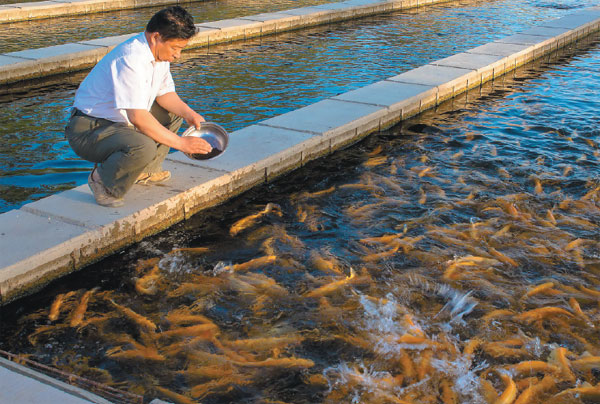Fishing in the desert
|
He feeds the rainbow trout at his fishery in Dunhuang. |
China is one of the countries most severely impacted by desertification. There are 2,620,000 square kilometers of land degraded by desertification in China, which makes up one-third of the national territory and causes more than 54 billion yuan ($ 9.59 billion) of economic loss a year, according to the State Forestry Administration.
In Gansu province, the situation is worse. Almost half of the land has gone through desertification. In Dunhuang, no matter how many trees the locals grow, they eventually die off because of extreme drought.
| A family art |
"You could dig as deep as 20 meters into the ground and still be unable to find any underground water," He says.
But years after He and his employees arrived in Dunhuang, spring streams have started running just 2 meters under the ground, as the waterways he built filter the floodwater and enrich the soil. More than 100 fishponds have been built and more than 800 tons of rainbow trout are harvested every year, not only to feed the local population, but also all over China.
When a once-in-a-century flood happened in 2011, completely damaging the fishery, Yangguan county downstream of the fishery remained intact thanks to the flood diverted by the fishery.
The fishing industry not only protects the locals' lives, it also brings comfort. One mu (0.07 hectare) of fishing pond produces about 10,000 kilograms of fish, which brings more than 60,000 yuan ($9,774) of profit, 600 times more than the profit from growing wheat. The fishery hardly consumes water while 1 mu of wheat uses up to 600 tons of water a year.
Born in rural Gansu, He was the first to develop a cold-water fish industry in Gansu. Cold-water fish, such as salmon, sardine and trout, are considered healthy eating and attract high prices at market. By 2000, He was already a billionaire and deemed as "the king of rainbow trout". In 2001, He was invited by the Dunhuang municipal government to invest in Dunhuang, a historical city threatened by the Kumtag desert.
"There was nothing but sand. No water, road, or electricity," He recalls his first days in Dunhuang.
But He was confident that once he drew the snow water from the neighboring Qilian Mountains and Altun Mountains to the desert, it would be a perfect area to develop fishing.

























